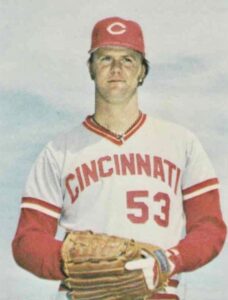
It was my good fortune to meet DeQuincy, Louisiana native Scott Brown and his wife Cheryl at the Emeralds’ Las Vegas reunion. To say he is a beloved figure is an understatement. He was not on the 1975 team but he did pitch for Eugene the following season, for Greg Riddoch. He eventually pitched in the big leagues for the Reds and Royals before arm injuries ended his pitching career.
He loves to come to the Ems’ reunions and see his teammates and manager — and the feeling is mutual. And Cheryl is a sweetheart who is always there for him; she’s part of this interview too. Enjoy!
Note: There is plenty of NSFW language here. But to delete that or “tweak” his grammar would give a false impression of Scott. He’s a good man: a straight-shooter who is raw and unfiltered and hilarious. As you read this, imagine Scott’s deep voice, with a healthy drawl that’s impossible to duplicate.
Jim Haught First, thank you, because I lived in Cincinnati when you pitched for the Reds. Throwing – humming that thing in there, and —
Scott Brown Yeah, and I wish I could still do that.
JH You have an unusual background, because I understand you are a javelin thrower instead of a baseball guy. But you said you played football and didn’t like it.
SB Yup!
JH Played basketball — didn’t like it.
SB Nope!
JH You were a track guy?
SB I loved track! Just throwin’ and jumpin’. None of that damn runnin’ shit! That’s boooolshit; you run your damn brains out! [laughter]
JH You were in the “field” part of track-and-field!
SB Damn right!
Cheryl Brown He set some state records, too.
Throwing the javelin
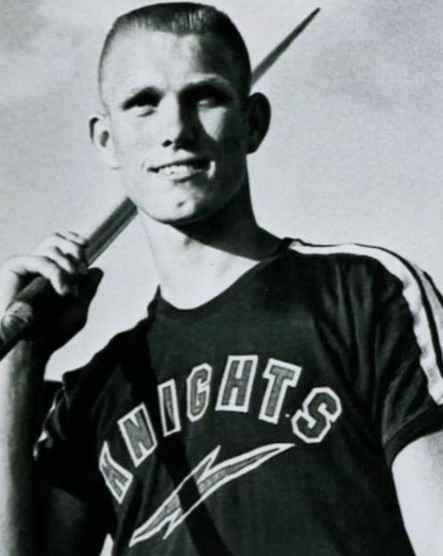
JH You threw the javelin. You and another Louisiana guy: [Steelers quarterback] Terry Bradshaw!
SB Yeaaaaah! Terry had a good arm, that Terry!
JH He said that his arm was even better in high school than when he was in the pros.
SB That’s amazing!
JH What got you interested in javelin? You just like throwing stuff?
SB I liked to throw shit!
CB Oh wait, I got a story to tell:
He was throwing shit when he was eight or nine or 10 years old. There was a Ford Motor Company — what do you call it? — where they sell the cars. And they threw rocks at the windows. It had — where the machinery was, and everything — they had this big, long line of windows. And he busted out a few windows.
JH So you always had a good arm.
CB He always had a good arm.
SB Yeah.
JH Is that hereditary? Do other people in your family have good arms? Any other pitchers in your family?
SB My little brother could thow. My baby brother, yeah. The brother I lost was Ricky, and he got killed when he was 16. He was an athlete. He’d have signed pro as a catcher. He had a good arm. And he was good. He was good. I was a kid when he died. Yeah. And then my other brother –
CB They were all athletic. All of them!
SB Yeah. My other brother — not for sports.
CB They didn’t have the talent that he had.
SB No, I just had an arm.
Trying out
JH So you’re in high school and you’re a javelin guy, and you get talked into trying out for baseball, or how did that go?
SB No, don’t remember that part. But I remember Larry Doughty. Don’t remember how he came into my life, other than — we had a Sheriff League that, the Sheriff’s Department of Lake Charles donated a few bats, gloves, everything. And all we had was, I don’t remember our uniforms; wasn’t much. The Sheriff’s Department is who we played for, but it was, we played in
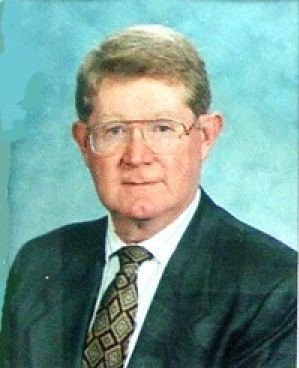
Maplewood, Louisiana, which is in Sulphur, which is 20 miles from DeQuincy.
And my Daddy told me I either play football, or I wasn’t gonna play summer-league baseball. That’s why I played football. Hated football. But I played because my Dad told me I had to.
CB The baseball league was recreational. No high school. No high-school ball at all.
JH You didn’t have a high-school team?
SB Uh-uh. I begged. I mean, we sucked at basketball, we sucked at football, track — H.L. Perkins signed with the Kansas City Royals waaay before me. He had an arm that was unbelievable. Anyway, he fizzled out.
I said, you got all this talent down here, and you ain’t usin’ it! Long story short.
JH Enough for a team, anyway.
SB Yeah! I graduated, and the next year, they got baseball.
CB Somebody saw you at a walk-on tryout at McNeese, or something? No?
JH Because Greg Riddoch was saying they were actually looking at somebody else. They saw you, and said, “Hey, whoa!”
SB He came to — yeah, we did. H.L. Perkins – the one I was telling you about — come and got me and Steve Deal on a Saturday: Get y’alls’ gloves and cleats, and come on! And he did. He took us down there. I remember. That’s right. H.L. Perkins, he took us down there. We weren’t supposed to be in there, because we weren’t old enough. I think we were 17 or 16, or whatever it was.
JH Because you were 19 when you signed, right?
SB Yeah. So I was like 16 years old; we wasn’t supposed to be out there. We lied and told him we was 18. They didn’t check. Went out there, me and him pitching, we were pretty stupid. We went out there, and we get in the outfield. I told him I was pitcher, da da da da. They put us in the outfield. I took my turn [in a] rotation, to catch me, you know. We was in the outfield, so we will show him what kind of arms we got. Well, they hit the ball to me, and I thowed it over the backstop!
You dumb sumbitches! You stupid mofos! We ain’t got no more balls! There’s a canal back there!
Well, you didn’t tell me that shit!
Anyway, that’s where he saw us. It was a tryout. Cincinnati Reds. Well, it had to be – 1973?
CB It was early, yeah. It was way before you were eligible to go.
Pro ball
JH You started in 1975 in Billings, right out of high school –
CB Straight out of high school!
SB I didn’t know shit about baseball!
JH Because you were in 10 games at Billings, started two of them, 18 innings total. Was that enough to get your feet wet, to see what you had and let them get a good look at you?
SB Yeah. I didn’t know what the hell they were doing.
JH Well, then they bring you back in 1976 –
SB With Rid!
JH — and you’re 6-4, most of the time as a starter?
SB Yeah.
JH 102 innings. Was your arm up for that? Were you used to it, or —
SB No, but I did it. Yeah. I was a starter in Sheriff’s League, and then when I come up I was a starter, but I liked that bullpen.
JH Blowing and going?
SB Uh-hmmm. That was it! But they made me a starter.
JH Because you were a starter — I mean, it looks like, most of the time — up until 1980, when you hit AAA. And then they made you a reliever?
SB Yup. George Scherger did. He told me – I hated that bastard – he told me, the only way you’re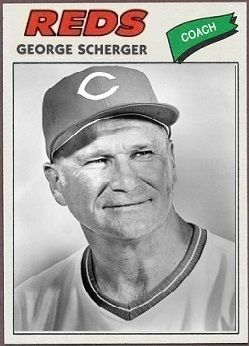 gonna make the big leagues is in the bullpen.
gonna make the big leagues is in the bullpen.
JH Did they think you didn’t have enough pitches, or — ?
SB Well, my curve ball was called a slurve [cross between a slider and a curve].
JH There was none of that grab it and throw it like a curve ball thing?
SB Nah, nah, nah, nah. All that old bullshit, I just never could get it over the barrel –
JH Pull the window shade down? [Back then, that’s how some pitching coaches described throwing a curve ball.]
SB Yeah! I couldn’t do it. Couldn’t see it. I got the slurve, and then I had a pretty decent 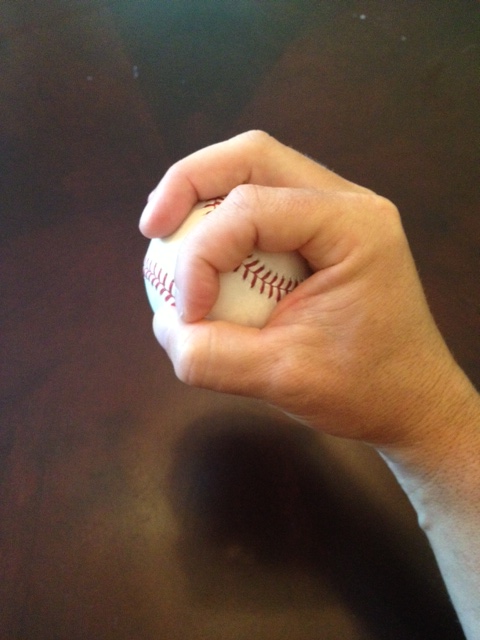 changeup. Pretty good changeup.
changeup. Pretty good changeup.
JH What was it? Circle change?
SB Yeah. It was a good one. [But] what got me to big leagues was my fastball. Definitely wasn’t my offspeed pitching.
JH They were kind of “show” pitches?
SB Yeah! You ain’t going to trick too many people with my stuff. You either blew it by them, or you didn’t. That was it!
JH What I don’t remember is, what kind of fastball you had — like two-seam, four-seam, running, or —
SB Any way I grabbed the damn ball! I didn’t give a shit! [laughter]
JH Just chucking-and-ducking?
SB Yeah! [laughs] I did learn going on. But first year? I just grabbed the ball. And sluuuung it. I didn’t know all this shit. And then Greg was, you know, across the four seams and all – he taught me all that.
JH Because you look at your record and you think, you could have been in the big leagues sooner, with the record you had. Were you just behind somebody that you couldn’t get through, or what do you think?
SB I don’t know. I have no idea what the hell the problem was. I should have made the damn team in spring training. But I don’t know.
JH That was 1981? The strike year?
SB Uh-hmmm. [thinks] No, it was 1980 – the year before. I should have made the team then!
JH Oh, yeah. You were 6-7, 3.44. 11 starts and 29 games in relief. 123 innings is a pretty fair amount of innings for a reliever.
SB I had a hell of a spring training. I was blowing their asses away. And they sent my ass back to Indy. I said, well, fuck! What are you supposed to do?
JH Were you one of those guys who got sent out because you had options left?
SB I don’t know what kind of options –
CB And because he didn’t fuss. You know, squeaky wheel gets the –
SB No, I don’t know why.
JH You were just showing up for work?
SB That’s it! Yeah.
1981: Debut against the Dodgers — and a win
JH But you finally did make it in 1981. First game was against the Dodgers, in relief.
SB Oh, yeah!
JH How was that?
SB Oooooooooooooh! You know, you’re supposed to take that little thing [bullpen cart] into the game? Fuck that! I ran all the way in! They wanted me to get in that thing, and I said, No way! Fuck you! I took off running! [laughter].
Scott was a little jelly-legged by the time he got to the mound.
SB I got up to the mound and [manager John] McNamara said, are you OK? I said, well, I ain’t got no knees, but – McNamara says, just rear back and throw the damn ball!
Oh, I can do that!
JH 2-1/3 innings pitched, two hits, no runs. You get the win.
SB Bair was the starting pitcher.
JH Really? Doug Bair was the starter?
[It was 8/11/81; actually, Mario Soto started; 4.1 IP. Bair relieved him and went 1.2 innings. Scott relieved him, then Tom Hume relieved Brown with one out in the 9th; Steve Garvey struck out to end it. 7-6 Reds.]
SB Doug! I come in behind Doug.
JH Boy, he didn’t start many games for Cincinnati; he was mainly a short guy. Had a bunch of saves there, for a little while.
Cup check!
JH Were you pitching as a setup guy? [Or] you’re the rookie, so you go in whenever they tell you?
SB I wasn’t supposed to pitch that day, I knew that; I just walked in. I did pitch in Atlanta, an inning. It didn’t count for shit. I remember we played an exhibition, we played the Angels, and I pitched an inning, and that was my first encounter with Rod Carew. And they told me, you’re not going to strike him out.
JH Did he bunt on you?
SB No, he didn’t bunt on me; I would have killed him [laughter]. No, he shouldn’t have done that. He — I couldn’t get him. I thowed that damn ball that far out. He fell in the back and fouled it; is he some fucking cyborg or something? I was fixin’ to throw it behind his damn head and see if he’d hit it. I didn’t strike him out; I don’t remember what happened.
And then the next day started the season. They called down about the third or fourth inning: get up and get your throwing in. That’s all I was gonna do, so I didn’t even put my cup in.
JH Whoa!
SB Oh man! Me and Bench in the bullpen, we were just throwing, and he was telling me, you know, giving me pointers. Bench? You listened to what he told you!
And I was getting’ my throwin’ in to him, and then all of a sudden, the damn phone rang. I wasn’t payin’ attention to what was going on out there; they were ripping him. Come to find that they were rippin’ his tits.
They said, get up – I don’t remember who. They said no, we’re bringin’ in Brown. Bench looked at me and said, you’re fucked! [because he wasn’t wearing a cup]!
JH Yeah! No one-hoppers, please! [laughter]
SB Whoa! Shit!
They tell me, you’re going in! And I said, whaaat? Noooo! But I grabbed my cup –
JH Oh, you got it in? Man!
SB That’s when I took off running. Once I got out on the mound and started throwing, I was OK.
JH So you weren’t nervous or anything?
SB Oh, I didn’t say that! I said it was okay.
JH But you were good enough to do it.
SB Yeah. I’ve never kissed my cross that many times, though, throwin’ a baseball. And it all worked out. Scared shitless, but it worked out.
JH Two-and-a-third innings! They must’ve thought you were throwing okay, if you went back for two more innings after that.
SB I went into the dugout: I’m done. I’m done, you know.
Ah, well, keep your hat and everything on. You’re going back in.
Whaaaat? I said, OK.
I went back in. Next inning, I got ’em out 1-2-3. Sit down. Thought I was done. Bair’s bat was coming up. I couldn’t hit that damn chair with a bat. When they told me I was gonna hit, I was, I never hit! I had my baseball hat on; didn’t grab my glove, thank God, because they would have laughed my ass off the field. And I just grabbed a bat and took off runnin’.
I don’t remember who it was, who yelled: Stop, stupid! STOP!
JH You needed a helmet?
SB I needed a helmet! I was so fuckin’ embarrassed.
JH And they didn’t have one for you, I bet!
SB Naw! And I run my big ass out there, and — Dave Stewart.
I never saw a ball. You know, I’m always up there, throwin’ 100 at them. And here this big man is – 100 miles an hour. I swung, by God! I didn’t see shit, but I swung!
JH Hey, at least you didn’t take strike three.
SB I went down swinging.
JH Like you should!
SB Yeah, well, I was so glad that shit was over – that first go-around. When I went back out, I don’t remember who it was, but they hit the ball — a ground ball in the infield – and that was it. I got the next two out. And that was my debut.
JH That was the beginning. And so you get into nine more games in 1981, 2.77 ERA. So you’re putting them down pretty good now. Are you thinking, I got this big-league thing. I know what I’m doing now?
SB Noooo, no, no, no, no. That took a little while. That’s being — coming in there in situations that I dreamed about: please, never let that happen to me! Bases loaded, or two on base.
That damned Mike LaCoss — I come in behind him, in Cincinnati, two guys on base, no outs. And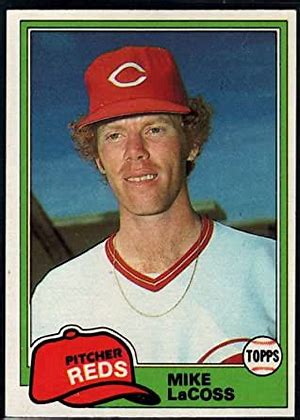 the winning run was on first. I was about to shit. But I got ’em out! I saved that puke!
the winning run was on first. I was about to shit. But I got ’em out! I saved that puke!
CB Do you know Buffy?
LaCoss was nicknamed “Buffy” because his curly hair reminded folks of the character from the 1960s sitcom Family Affair.
JH I know of him, but I’ve never met him.
On to Kansas City in 1982
JH Okay, so you finish 1981. Do they tell you — give you any indications for 1982 what was gonna happen? Because you got traded in December 1981, for Clint Hurdle.
SB Yeah. Yeah. No, I had no idea.
JH No clue that was coming?
SB Oh, no way. Oh, I’m a liar. I think a day or two before it actually — they called me — I called him Slick. Dave, uh — oh for Christ’s sake! You know, I played with him in the big leagues in 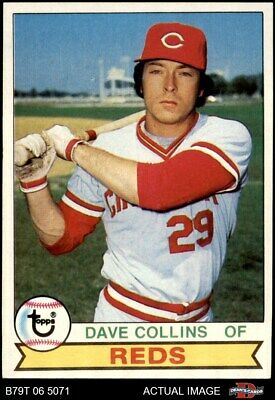 Cincinnati.
Cincinnati.
CB Van Gorder? Collins?
SB Collins! I called him Slick. He called me:
Brownie, you’re fixin’ to get traded.
Oh? The hell you say!
We talked, and he told me: yeah, you’re fixin’ to get traded to the Kansas City Royals. They didn’t tell me about Clint Hurdle, or none of that.
And I didn’t think to ask Collins, how the hell do YOU know? But I never did. So yeah, I knew a couple of days before I was going to be traded. Or the day before – shit.
JH What were your thoughts about going to Kansas City? I mean, you missed the worst Reds team ever, in 1982. They lost 100 games, and they earned it! [laughter] And Hurdle was part of that! He didn’t do diddly for the Reds that year. And neither did anybody else, but — 150 years they’ve been around, and they lost a hundred games one time, and that was 1982.
SB Ooh! I’m glad my ass wasn’t in there!
Kansas City was great. That’s who I wished I’d have – and I didn’t know it at the time – I liked the Reds, grew up with the Reds; I was a kid. Anyway, Kansas City organization, compared to Chief sorry-ass Blender – [laughter; he’s referring to Sheldon “Chief” Bender]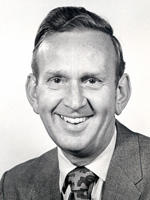
JH Blender! Wow!
CB Blender! [laughter]
SB Hated that man!
JH Well, you’re not alone there, either.
SB Ooh, that bastard! But anyway, [more laughter] They paid us — I could have killed that — I could’ve killed him. Fifty bucks! I’m gonna shove that $50 up your ass.
JH What was the 50 bucks for?
CB Increase, per year!
SB INCREASE! 50 bucks! You better shove that up yo’ ass!
JH You must have had a hell of a year to get 50 bucks more!
SB I was pissed!
CB One year, it put us into the next tax bracket, and so we lost money!
SB That was a sorry-ass – well, I ain’t gonna say that – ah, human being. Jackass!
JH But you got treated better in Kansas City?
SB Oh, yeah. Oh yeah. Hell of a lot better. You wasn’t just a piece of meat.
JH Gotcha.
SB And that’s what damn Blender made you think — that you wasn’t worth a –
You have to earn it. You gotta prove it to me!
I don’t have to prove to you a goddamn thing!
I wanted to kill him.
Anyway, [the Royals] treated us great.
JH But you got hurt.
SB The frigging arm.
JH What happened? Was there one particular pitch?
SB Yeah, slurve. I got too far out here. I’d been pitching like that my entire career. I would try to stay on top, and I didn’t.
JH So you came lower — ?
SB Apparently, yeah, that’s what happened. And then that made a snap, and I knew: Oh shit! What was that? You shake your arm, didn’t hurt. Nothing. But when I tried to throw a baseball?
A ligament was gone; medial collateral ligament. Tommy John surgery.
And then they sent me everywhere.
CB You went home first, to [his personal physician].
SB And he told me — he diagnosed it right, and wrong. He says it’s either a ligament tear – which it was — or what’d he say?
CB Tendinitis? I don’t remember.
SB Can’t remember. But he said, but don’t pick a baseball up again for 10 weeks.
Hell, I was an athlete. I had to do something. And then he said, don’t let him stick needles in it. What am I gonna tell these people?
CB Because that was a personal doctor.
SB Known him all –
JH You’re going to have to see the team doctor, and do what they say –
SB Yep! Exactly what I told her. I got doctors with Kansas City I got to answer to. Long story short, I came back and they immediately made me start throwing. Stuck a needle in it. They asked me, do you want to try a needle and see if it helps? That don’t scare me.
It didn’t work.
Then finally they sent me to Frank Jobe.
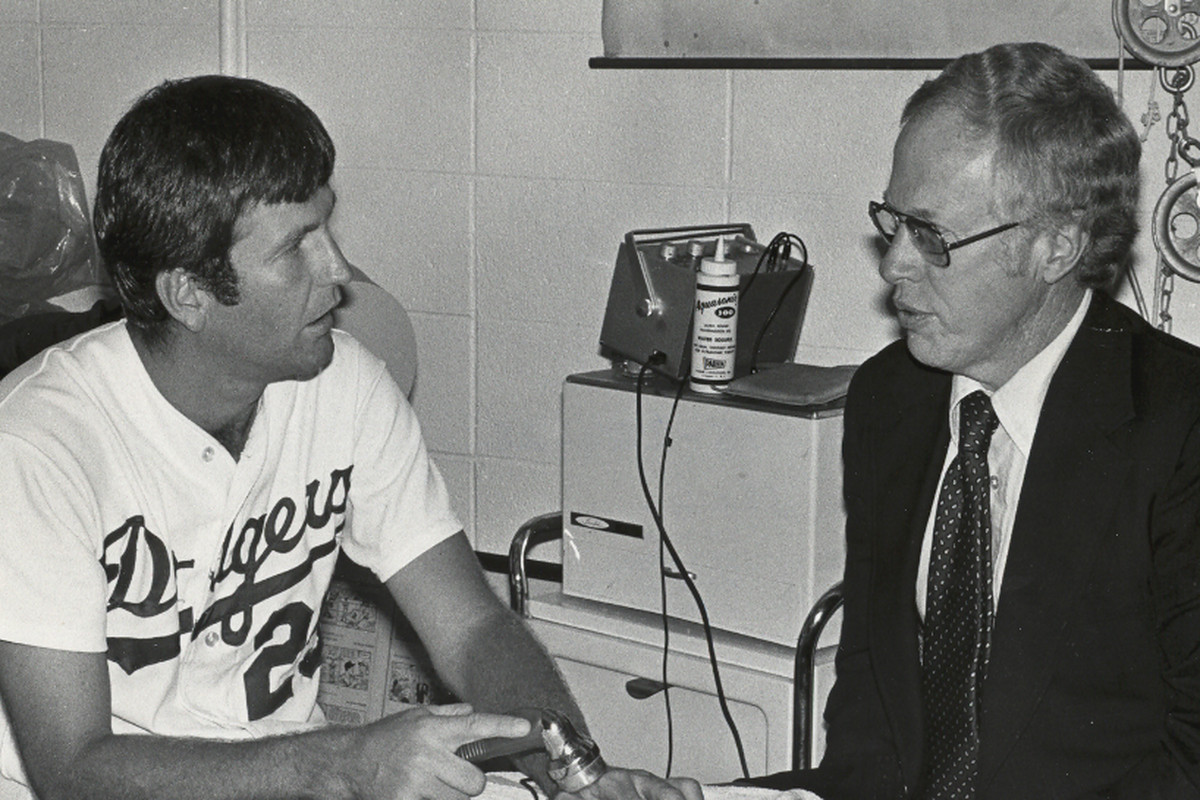
JH He’s the man!
SB The man! Weird-looking human being. I saw him and I went, Oh, shit! He’s gonna cut on me? But he was good.
But coming back, I was thowin’ to [Royals catcher] John Wathan.
JH Duke! [Wathan was known for his excellent John Wayne impression.]
SB Yeah! Duke! The catcher. He caught me in the big leagues one time. Anyway, he caught me, and he said, you’re throwing harder than you did when you left here. That made me feel good: I’m coming back! But I didn’t rush it; I don’t know what happened.
I was pitching – I guess we were in Kansas City. I was there the whole time, I guess on the disabled list. First they sent me out to build it up, and it didn’t work. You could build the muscle. And they did; it like to killed me. But that does nothing to the ligament, you know? That’s when they did Jobe; and I came back and was throwin’ great. And the ulnar ligament snapped.
JH So you had both of the two big ones.
SB Uh-hmmm. He relocated it in here somewhere. Jobe relocated my funny bone to get to the ligament.
CB Oh, okay. But the second surgery you had, Dr. Bennett did it.
SB In Houston. And he told me, he said, your career is over in ball. And I’m an athlete: you let me worry about my career, and you take care of my arm.
JH What happened? Did it just not come back, and you could tell after a while, this isn’t going to work?
SB Oh, yeah! That’s what I did. I tell you, I went out to Phoenix for a tryout, and I couldn’t get it up to – 88 – if I could have just hit 90 –
JH You could have worked with that.
When I couldn’t even [hit 90 MPH]? It’s over. It like to killed me.
SB I could’ve worked with that. But when I couldn’t even do that? It’s over. It like to killed me.
JH Did your arm hurt coming back?
SB Eh, you know –
JH I mean, other than normal stiffness and things?
SB And right now? Shit.
After baseball: tough times and big adjustments
SB When I got out of baseball, I went to liftin’ weights, and worked with the railroad. Well, I got strong. But still couldn’t pick up a rock and throw it.
JH You could do everything but the one thing you wanted to do?
SB The one thing I wanted to do was throw.
JH How tough was that to deal with?
SB It was tough. Man, going from throwing 90 or 100 or whatever, to 80? Sheeeeit! And I was a fastball pitcher; I either brung it up there, or I sat on the bench, which is what ultimately happened.
CB Yeah, if you don’t have to your signature pitch, what –
SB Well, that party was over; and that hurt.
JH Was the mental part of it the toughest thing?
SB Yeah.
JH It’s one thing to go through rehab and have it hurt. But then to realize in your own mind – [long, silent pause]
SB That it’s over.
JH — I can’t do what I want. I can’t do this the way I want.
SB Yeah, I hid it pretty good, but oh yeah, it like to killed me. Yeah.
JH How did you deal with it? What did you do?
SB I just went to work.
CB Drank like a fish.
SB Drank like a – yeah, drank like an idiot. I was an alcoholic; can’t drink [now].
JH I understand.
SB I messed up.
JH But you got through it.
SB Yeah. I went to rehab to get off of it. I did it. And I’m in the middle of something right now: getting off of opioids.
CB For his back pain.
SB My lower back – damn, it hurt. But they weren’t working; they wasn’t helpin’. But it was a booger to get off of them.
And if it wasn’t for her, I’d have never quit. And my son. But I did it.
JH Well, behind every man there’s a good woman, especially if you’re a ballplayer. Wives of ballplayers or wives of people who love baseball? [laughter] Let me tell you, that’s no day at the beach.
SB Oh, they get mad! But it all worked out. I made a good living on the railroad; it all worked out good.
JH The work was okay then, on the railroad?
SB Well, not for about the first eight or nine years; I went through hell on the bridge gang. You talk about hot! On the ballast, in August, in Louisiana. Humidity you could just drink through air. Until I got into transportation — no, I became an engineer. I don’t want to blow my horn at you. Then it was great. The last 25 years — maybe a little less, maybe a little more — I loved it. I love to run a train. Piss people off with that horn! [laughter]
JH I might’ve been one of them! [laughter]
CB He was the same person as a railroader that he was as a baseball player! Just different ways, different ways to do it. You know? [laughter]
SB I had to come off that engine a couple times. Sumbitches thowin’ shit at me in the window, and I’m sitting there laughing at ’em. I grabbed me an arrow; gonna bust somebody’s ass! Or get mine busted!
JH Well, you were going to go down flaming, one way or the other.
SB Yeah. It was fun. I enjoyed engineering railroad.
JH Well, at least you found something to fill in. But does anything replace playing ball?
SB Oh no! Hell, no! You can’t beat that.
Playing for The Riddler
JH How was it, playing for Greg Riddoch?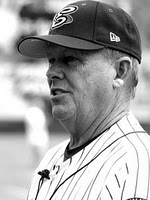
SB Greg and them? Well, Greg was – there’s no words for that. We had so much damn fun with that nut! And put Greg and this nut together? We had a blast!
And part of “having a blast” was occasionally taking advantage of a raw rookie:
SB In Eugene, bad weather or something came in – there was a little calamity going on — and the son of a bitch said, hurry, run, run, run! Go in and get the key to the batter’s box! I was going runnin’ in there and – Oh yes, I need the key – those sons of bitches, they dogged on me!
JH They busted you!
SB You bastards! [laughter] I went back out there, and they was all laughin’, runnin’ – I grabbed me a bat and I was gonna kill ’em!
JH But did he teach you a lot? He had such a rep as a teacher, more than even more than even a manager or coach, or like a game manager, but he’s got all these young guys who — he was teaching you how to be a pro player?
SB Yeah. Greg taught me more than anybody. Hell, I was real green. He took my green ass and started turnin’ things around, little bit by little bit.
JH What kinds of things would he do to help you?
SB Fundamentals, and stance on the mound – everything. Hell, I didn’t know how to do none of that! Just get up there and rear back and throw it!
JH But you had pitched for a year before you were with him, right? Part of a year –
CB In Billings.
SB Yeeeeaaahhh, but —
JH Then you got to Eugene the second year.
CB You did fall ball that year, too. You went to Tampa in the fall.
SB Oh yeah.
JH/CB Instructional League!
SB I hated that shit.
JH Really? Were you ready to be done after the regular season?
SB No, no, no. Not necessarily that; I just don’t like Florida. I hate Florida.
JH Too much like Louisiana?
SB Exactly!
CB Who was your coach in Instructional League?
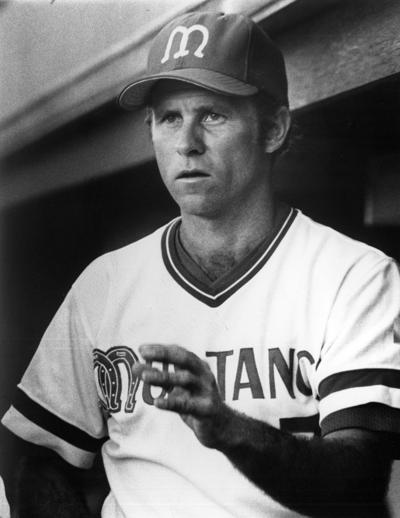
SB Hoffy! He’s dead now, and I ain’t gonna talk bad about the dead.
JH Jim Hoff?
SB He didn’t teach me much.
JH But you got hold of Greg, and — then the next year he was polishing you up.
SB I got with Greg, and I learned a ton. Greg was great! Plus, he made it fun. There was a few times, if I could catch him, I woulda choked him, but I couldn’t catch him. Yeah, he taught me a ton.
JH What makes this thing [Emeralds reunions] so special that all these guys keep coming back? Is it Greg?
SB Greg! Oh yeah. Yeah! Go see everybody, but Greg, I never had anybody teach me stuff like he did. Scotty Breeden tried.
CB That was Billings.
SB He was just … different. He couldn’t quit cussin’ long enough to teach you anything. Greg was just the opposite. Very Christian man.
CB What about Beachump? Who was he with?
JH Jim Beauchamp?
SB Indianapolis. AAA.
AA was — first year in AA was –
JH Was Vern Rapp there?
SB Naw.
JH Roy Matyjka?
SB Nooooooo. Anyway, he taught me more than anyone.
CB Greg did.
SB Greg did. Then I went to Tampa, and then I got hooked up with Mike Compton, and he was good. And Mike Compton wasn’t no pitcher, you know.
JH So it takes a pitcher to relate to a pitcher?
SB Yeah. I went to Nashville with George Scherger. And I hated that bastard. But he’s the one that put me in the bullpen. Then the next year in Indianapolis, and the next year in the big leagues – in the bullpen.
But all this here? It’s because of Greg.
Hindsight
JH Any regrets?
SB Regrets?
CB Do you have any?
SB Yeah, I wish I’d never thowed that damn curve ball that day! Hell yeah!
CB But how do you know?
JH You never know how many pitches you have in your arm.
SB Yeah, yeah. Maybe it was over. Maybe, my ass! It was over!
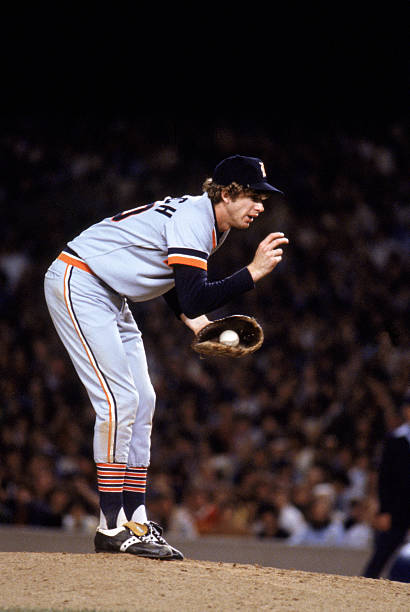
Mark Fidrych, he and I, we played against each other and we got to know – become friends. I liked Mark. And we was talkin’, and he was telling me about what he was going through – he couldn’t come back.
JH They didn’t diagnose it until way later, and then he finally got it fixed.
CB And it was too late; too much damage done.
Hey, I’m going to toot [Scott’s] horn. He did everything he could to get to come back.
SB I did what I was supposed to do.
CB He tried all those years; I think it was like three years. He kept getting in shape and he’d go out and try out again, and —
SB It wasn’t meant to be; it wasn’t meant to be.
I could have stayed on and maybe helped, like a coach or something. But if I couldn’t play the game, piss on it! I went home and got a job.
JH I heard the story about what happened when you said you lost baseball. And the response was, you didn’t lose anything.
I went to school with a woman whose father got one at-bat for the 1938 Cleveland Indians and struck out, and that was it. He never got called back up, and he was embarrassed about it.
SB Really?
JH And I said, “embarrassed? You made it.” So did you. You beat the Dodgers, for God’s sake! [laughter] In your first game! [more laughter]
Be proud of that, is all I can say.
CB He just liked throwing the ball! [laughter]
All of the Emeralds have Scott Brown stories. And without fail, they are told with fondness and affection. Here’s one from Paul Moskau, told with Scott’s approval.
Paul Moskau We were pitching side-by-side on the mounds in Billings; we’re warming up together and we’re throwing, and you know, fastball, da da da. And so I go, curve ball! And he’s standing next to me and he watches. And I had a pretty damn good curve ball.
So I throw it, and he’s looking at me, and I got the ball back and I wasn’t paying much attention. I threw it again, and I looked over. I said, what’s up?
And he goes, what was that?
I said, it’s a curve ball.
He said, I’ve got to git me one of they-um!
JH [drawls] Ah gotta git me one a they-um! [laughter]
PM I thought that was the funniest damn thing I’ve ever heard in my life.
JH Well, it parallels one that the Greg was telling me about the first time he saw Scott Brown pitch:
He told him the pitches he wanted him to throw, for about 10 pitches. And so he starts firing away, and all of a sudden he sees this hellacious fastball and — who is this guy? And he throws the pitches and he looks — when he gets done, his socks are around his ankles, his uniform pants are hiked up, his hat’s off to one side. His hair’s falling out the other side. And Riddoch says, I think we got one here! But look at this guy!
PM Raw. But I mean, he didn’t care about any of that crap. You just give him a baseball. He just threw it; and he threw it really hard, and it was one of those heavy balls, those heavy, sinking kind of fastballs.
JH Hurt your hand if you’re the catcher!
Excerpted from my book The Little Red Wagon: The 1975 Eugene Emeralds.

